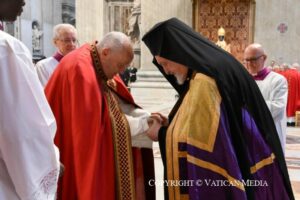Exploring the lives of two remarkable Apostles, Peter and Paul, unveils a fascinating journey of transformation. Peter, a humble fisherman from Galilee, and Paul, a former Pharisee who once persecuted the Church, both underwent a profound change through the grace of God. Their stories serve as a source of inspiration and exemplify the unwavering apostolic zeal that defined their lives. In encountering the Lord, they experienced a liberation akin to a true passover – a doorway to a new life swung open before them.

 As we approach the Jubilee Year, let’s reflect on the symbolism of the door. The Jubilee beckons a time of grace, where the Holy Door swings wide open, inviting all to step into the living sanctuary that is Jesus and immerse themselves in the love of God, revitalizing hope and joy within. The narratives of Peter and Paul unveil multiple doors of opportunity.
As we approach the Jubilee Year, let’s reflect on the symbolism of the door. The Jubilee beckons a time of grace, where the Holy Door swings wide open, inviting all to step into the living sanctuary that is Jesus and immerse themselves in the love of God, revitalizing hope and joy within. The narratives of Peter and Paul unveil multiple doors of opportunity.
The account of Peter’s miraculous deliverance from prison echoes the imagery of Passover. An event set during the feast of Unleavened Bread, reminiscent of the Israelites’ exodus. The angel’s instructions to Peter mirror those given to Israel – an indication of a new exodus. God, in his mercy, liberates his Church, freeing his people in captivity, showcasing himself as a God who guides and supports them on their journey.
On the night of liberation, the prison doors were first supernaturally opened, followed by the iron gate to the city, opening on its own accord when Peter approached with the angel. The symbolism is poignant – it is God who opens doors, paving the way for freedom and progress. Although Peter held the keys to the Kingdom, he learned that it is the Lord who ultimately opens doors, leading the way. A lesson worth noting – while the prison doors opened through God’s strength, entering the Christian community’s house posed a challenge. The reluctance to open the door reflects the wisdom often overlooked in communities.



 Paul’s journey mirrors a passover experience, deeply impacted by his encounter with the Risen Lord on the road to Damascus. Subsequently, contemplating the crucified Christ, he discovers the grace found in weakness. Paul’s transformation leads him to surrender to Christ, allowing His presence to dwell within him. This profound experience ignites a fervent zeal for evangelization, epitomized by his unwavering commitment to spreading the Gospel message.
Paul’s journey mirrors a passover experience, deeply impacted by his encounter with the Risen Lord on the road to Damascus. Subsequently, contemplating the crucified Christ, he discovers the grace found in weakness. Paul’s transformation leads him to surrender to Christ, allowing His presence to dwell within him. This profound experience ignites a fervent zeal for evangelization, epitomized by his unwavering commitment to spreading the Gospel message.
Paul’s numerous opportunities to proclaim the Gospel are likened to open doors. His missionary journeys with Barnabas highlight how God opened a door of faith to the Gentiles, emphasizing the power of God’s grace to reach every corner of the earth. Paul’s letters further emphasize the significance of open doors in enabling effective evangelization, urging communities to pray for doors to be opened for the word of Christ to reach all.
Both Peter and Paul bore witness to God opening doors not only to their personal liberation but also to the broader mission of spreading the Gospel. As we stand on the brink of opening the Holy Door this year, may we draw inspiration from their example and open the door of our hearts to the transformative power of the Lord Jesus.

 As we witness the Metropolitan Archbishops receive the pallium, let us be reminded of their role as dedicated shepherds, following in the footsteps of Christ. Through their ministry, they embody the essence of being gatekeepers for the flock, opening doors to the Gospel and fostering a community founded on inclusivity and acceptance.
As we witness the Metropolitan Archbishops receive the pallium, let us be reminded of their role as dedicated shepherds, following in the footsteps of Christ. Through their ministry, they embody the essence of being gatekeepers for the flock, opening doors to the Gospel and fostering a community founded on inclusivity and acceptance.
In solidarity with the delegation of the Ecumenical Patriarchate and the shared pursuit of unity between our Churches, let us embrace the spirit of communion and extend warm greetings to all advocating for harmonious relationships between faith communities.
May the legacy of Saints Peter and Paul inspire us to unlock the door of our hearts to the Lord Jesus, offering prayers for the well-being of Rome, global harmony, and universal peace. Amen.



